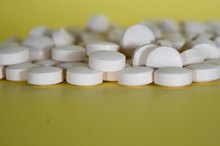Side Effects of Red Wine Extract
Excessive alcohol consumption is associated with an increased risk in a number of health complications including high blood pressure, and heart and liver disease. However, when alcohol is consumed in moderation, especially red wine, there may be some health-related protective benefits. Red wine extracts, which are primarily composed of the powerful antioxidant resveratrol, are currently being marketed as heart-healthy supplements. While there is some scientific evidence that supports the benefits of resveratrol, there are also reports of potential side effects associated with resveratrol supplements.
Blood Thinner
While there are significant studies reporting the positive benefits of resveratrol and red wine extract, there are relatively few that document the potential negative side effects. According to the Linus Pauling Institute at Oregon State University, resveratrol has not been linked to any toxic or serious side effects in humans; however, the availability of clinical research data is limited. One of the known properties of resveratrol is its anticoagulation effects, which means that it inhibits the coagulation property of blood platelets that are important for blood clotting. While the anticoagulation effects by themselves are not necessarily a threat, when taken with prescription blood thinners, they may actually increase the effects and put you at risk for excessive bleeding.
- While there are significant studies reporting the positive benefits of resveratrol and red wine extract, there are relatively few that document the potential negative side effects.
- According to the Linus Pauling Institute at Oregon State University, resveratrol has not been linked to any toxic or serious side effects in humans; however, the availability of clinical research data is limited.
Drug Interactions
Side Effects of Guggul and Guggulsterones
Learn More
If you take medicine for high cholesterol, resveratrol supplements may interfere with the biochemical targets of these pharmaceutical agents. Most cholesterol-lowering drugs belong to a class of pharmaceuticals called statins, which are metabolized by the same enzymes in the liver as resveratrol. While there is no definitive clinical evidence that supports the antagonistic effects of statin medications and resveratrol supplements, it should be considered by you and your primary physician prior to starting the consumption of these particular dietary supplements.
Cancer
While there is ample research that suggests there may be anti-cancer benefits associated with resveratrol, there is some room for concern that it may actually promote breast cancer. According to the Linus Pauling Institute at Oregon State University, competing research studies suggest that resveratrol acts as a both an agonist and an antagonist of specialized cell receptors called estrogen receptors. These opposing actions are linked to breast cancer prevention and breast cancer promotion. Due to these studies, caution should be observed when using red wine extract supplements for their purported health benefits.
- While there is ample research that suggests there may be anti-cancer benefits associated with resveratrol, there is some room for concern that it may actually promote breast cancer.
Related Articles
References
- Linus Pauling Institute at Oregon State University: Resveratrol
- Chung JH, Manganiello V, Dyck JR. Resveratrol as a calorie restriction mimetic: therapeutic implications. Trends Cell Biol. 2012;22(10):546‐554. doi:10.1016/j.tcb.2012.07.004
- Liu Y, Ma W, Zhang P, He S, Huang D. Effect of resveratrol on blood pressure: a meta-analysis of randomized controlled trials. Clin Nutr. 2015;34(1):27‐34. doi:10.1016/j.clnu.2014.03.009
- Sahebkar A, Serban C, Ursoniu S, et al. Lack of efficacy of resveratrol on C-reactive protein and selected cardiovascular risk factors--Results from a systematic review and meta-analysis of randomized controlled trials. Int J Cardiol. 2015;189:47‐55. doi:10.1016/j.ijcard.2015.04.008
- Semba RD, Ferrucci L, Bartali B, et al. Resveratrol Levels and All-Cause Mortality in Older Community-Dwelling Adults. JAMA Intern Med. 2014;174(7):1077‐1084. doi:10.1001/jamainternmed.2014.1582
- Tan L, Wang W, He G, et al. Resveratrol inhibits ovarian tumor growth in an in vivo mouse model. Cancer. 2016;122(5):722‐729. doi:10.1002/cncr.29793
- Poschner S, Maier-Salamon A, Zehl M, et al. Resveratrol Inhibits Key Steps of Steroid Metabolism in a Human Estrogen-Receptor Positive Breast Cancer Model: Impact on Cellular Proliferation. Front Pharmacol. 2018;9:742. doi:10.3389/fphar.2018.00742
- Heebøll S, Kreuzfeldt M, Hamilton-Dutoit S, et al. Placebo-controlled, randomised clinical trial: high-dose resveratrol treatment for non-alcoholic fatty liver disease. Scand J Gastroenterol. 2016;51(4):456‐464. doi:10.3109/00365521.2015.1107620
- Mukherjee S, Dudley JI, Das DK. Dose-Dependency of Resveratrol in Providing Health Benefits. Dose Response. 2010;8(4):478‐500. doi:10.2203/dose-response.09-015.Mukherjee
- Weiskirchen S, Weiskirchen R. Resveratrol: How Much Wine Do You Have to Drink to Stay Healthy? Adv Nutr. 2016;7(4):706‐718. doi:10.3945/an.115.011627
- American Heart Association. Is drinking alcohol part of a healthy lifestyle? Updated December 30, 2019.
Writer Bio
Chris Bjorklund has been writing professionally since 2004 and has been primarily featured in peer-reviewed scientific journals such as "Nucleic Acids Research" and "Biochemistry." He has also been anonymously published as a content freelancer for several websites. He completed his doctoral degree in biochemistry at Washington State University in 2006.









